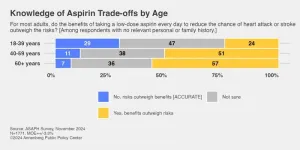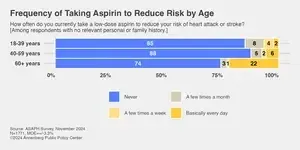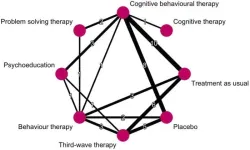(Press-News.org) For years, healthy older adults were advised by doctors to take a low-dose aspirin daily as a way to reduce the risk of heart attack. But in March 2019, the American College of Cardiology and the American Heart Association (AHA) announced new guidelines and no longer routinely recommended a daily dose of aspirin for healthy adults over the age of 70 because the risk of gastrointestinal bleeding outweighs the benefits.
Nearly five years later, many Americans still have not received the message.
The Annenberg Public Policy Center (APPC) of the University of Pennsylvania finds in a new health survey that nearly half (48%) of U.S. adults incorrectly think that for most adults, the benefits of taking a low-dose aspirin every day to reduce the chance of heart attack or stroke outweigh the risks. In all, nearly 1 in 5 U.S. adults who say they have no personal or family history of heart attack or stroke report routinely taking a low-dose aspirin, with 10% saying they take it “basically every day,” 2% “a few times a week,” and 6% “a few times a month.”
The past rationale for routine low-dose aspirin use was that aspirin acts as a blood thinner and reduces the clotting that can clog arteries and lead to heart attack or stroke. Low-dose aspirin is still considered an important strategy for preventing heart attack in people who have been diagnosed with cardiovascular disease and are not at risk of increased bleeding.
But doctors’ recommendations for healthy adults have shifted on the risks and benefits of taking a low-dose (typically 81 mg.) aspirin. In 2022, three years after the publication of the new AHA guidelines, the U.S. Preventative Services Task Force recommended against starting a new regimen of low-dose aspirin use for the primary prevention of cardiovascular disease for an even larger group of older adults – those 60 and older without a history of cardiovascular disease (including heart failure and stroke) or signs or symptoms of cardiovascular disease.
“Habits backed by conventional wisdom and the past advice of health care providers are hard to break,” noted Kathleen Hall Jamieson, director of the Annenberg Public Policy Center and director of the survey. “Knowing whether taking a low-dose aspirin daily is advisable or not for you is vital health information.”
Who takes a daily low-dose aspirin?
In the survey, 45% of respondents report that they or someone in their family has had a heart attack or stroke, while 49% do not have a family history of heart attack or stroke (6% are not sure). A 2024 AHA report estimates that 3.1% of Americans age 20 and older have had a heart attack and 3.3% have had a stroke, and over 48% of adults 20 and older have cardiovascular disease, including coronary heart disease, heart failure, stroke or hypertension.
Those with a personal history of heart attack or stroke may be directed to take a low-dose daily aspirin by their doctors. Those 40- to 59-year-olds who have a 10% or greater 10-year cardiovascular risk also may be directed to take aspirin, in line with the recommendations. Still, the survey finds that 18% of those with no history of heart attack or stroke report regularly taking a daily low-dose aspirin and 43% of this no-history group say that for most adults, the benefits of doing so outweigh the risks.
Among the group with no history, younger survey respondents are more likely to correctly report that the risks outweigh the benefits – possibly because older respondents are more familiar with the earlier guidance. Twenty-nine percent of respondents with no relevant medical history who are 18 to 39 years old correctly say that the risks of a daily aspirin outweigh the benefits, compared with 11% of those 40 to 59 years old and 7% of those 60 and older.
APPC’s Annenberg Science and Public Health knowledge survey
The survey data come from the 22nd wave of a nationally representative panel of 1,771 U.S. adults conducted for the Annenberg Public Policy Center by SSRS, an independent market research company. Most have been empaneled since April 2021. To account for attrition, small replenishment samples have been added over time using a random probability sampling design. The most recent replenishment, in September 2024, added 360 respondents to the sample. This wave of the Annenberg Science and Public Health Knowledge (ASAPH) survey was fielded Nov. 14-24, 2024. The margin of sampling error (MOE) is ± 3.3 percentage points at the 95% confidence level. All figures are rounded to the nearest whole number and may not add to 100%. Combined subcategories may not add to totals in the topline and text due to rounding.
Download the topline and the methods report.
The policy center has been tracking the American public’s knowledge, beliefs, and behaviors regarding vaccination, Covid-19, flu, RSV, and other consequential health issues through this survey panel over the past two-and-a-half years. APPC’s team on the survey includes research analysts Laura A. Gibson and Shawn Patterson Jr., Patrick E. Jamieson, director of the Annenberg Health and Risk Communication Institute, and Ken Winneg, managing director of survey research.
The Annenberg Public Policy Center was established in 1993 to educate the public and policy makers about communication’s role in advancing public understanding of political, science, and health issues at the local, state, and federal levels.
END
Nearly half of adults mistakenly think benefits of daily aspirin outweigh risks
2025-02-03
ELSE PRESS RELEASES FROM THIS DATE:
Cardiovascular disease medications underused globally
2025-02-03
Secondary prevention medications for cardiovascular diseases (CVD) are underused globally and additional strategies to increase their use are needed to improve CVD management and reduce premature mortality rates, according to study published today in JACC, the flagship journal of the American College of Cardiology. The study observed participants with CVD from 17 countries over 12 years and found that medication use remains low with little improvement.
Secondary prevention of CVD focuses on preventing further health problems in people already diagnosed with CVD. This includes managing risk factors through lifestyle changes, medications and ...
Amazon Pharmacy's RxPass program improves medication adherence, helps prime members save money, study finds
2025-02-03
Approximately half of all Americans do not take their medication as prescribed by their doctor. This medication non-adherence causes an estimated 125,000 additional deaths and as much as $300 billion a year in additional medical appointments, emergency department visits, and hospitalizations.
A new study published in the Journal of the American Medical Association (JAMA) Network Open finds Amazon Pharmacy’s subscription service for common medications, RxPass, leads to significant improvements in medication adherence while reducing out-of-pocket costs for patients. This first-of-its-kind study evaluated the potential of subscription models to support prescription medication access ...
Tufts University School of Medicine, ATI Physical Therapy launch first-of-its-kind collaboration to make physical therapy education and career advancement more accessible and affordable
2025-02-03
With demand for physical therapy services projected to increase 27 percent by 2030, Tufts University School of Medicine (TUSM) and ATI Physical Therapy (ATI), a leading provider of physical therapy services across the United States, are launching a joint initiative aimed at expanding the physical therapist workforce and making the Doctor of Physical Therapy (DPT) Programs at TUSM more accessible.
As part of the first-of-its-kind collaboration, TUSM and ATI will contribute scholarships each semester for up to 45 ATI employees in TUSM’s DPT programs each academic year. The accelerated ...
Could lycopene—a plant extract—be an effective antidepressant?
2025-02-03
Emerging evidence suggests that lycopene—a natural plant extract—may have antidepressant properties. New research in Food Science & Nutrition reveals the mechanisms behind its antidepressant effects.
In mice with depressive-like behaviors, brain analyses revealed impairments in the hippocampus. Lycopene treatment lessened these impairments and reversed the animals’ depressive-like traits.
Lycopene treatment boosted the expression of brain-derived neurotrophic factor (BDNF), a protein with roles in many aspects of brain function. Experiments indicated that a signaling pathway involving BDNF (called the BDNF-TrkB pathway, ...
Study shows urine test for prostate cancer could be used at home
2025-02-03
Researchers at Vanderbilt and the University of Michigan have shown that a simple at-home urine test for prostate cancer screening is highly accurate. The exciting new results, published in The Journal of Urology, build upon a prior Vanderbilt study of prostate cancer screening that required a digital rectal exam.
The results are important because this could enable at-home testing and increased access to testing for patients undergoing telehealth care or living in remote areas.
Traditional prostate cancer screening with PSA testing and biopsy has been shown to lead to unnecessary procedures and overdiagnosis of low-grade cancers, according to ...
Shaping future of displays: clay/europium-based technology offers dual-mode versatility
2025-02-03
The world of display technology is on the cusp of a transformative breakthrough, with electrochemical stimuli-responsive materials gaining more attraction. Based on external stimuli, such as low voltage, these materials can instantaneously undergo electrochemical reactions. These electrochemical reactions can result in the production of different colors, revolutionizing the age of display solutions. An electrochemical system consists of electrodes and electrolytes. Combining the luminescent and coloration molecules on the electrodes instead of the electrolyte can offer higher efficiencies and stability for display devices.
To this end, a research team ...
Optimizing ADHD treatment: revealing key components of cognitive–behavioral therapy
2025-02-03
Attention-deficit hyperactivity disorder (ADHD) is a well-known neurodevelopmental disorder that affects the brain's ability to regulate attention and control impulses. It poses many challenges to those affected, typically making it difficult for them to sustain focus, follow through with instructions, and maintain a calm and restful state. As one of the most common neurodevelopmental disorders, ADHD impacts individuals throughout their lives, creating a breadth of social, emotional, academic, and workplace challenges.
Despite its high ...
Breaking barriers in thioxanthone synthesis: a double aryne insertion strategy
2025-02-03
Thioxanthones are fascinating organic compounds that have found their way into many industrial and everyday applications. In the printing industry, for example, they help inks dry faster when exposed to light thanks to their light-absorption properties, making the printing process quicker and more efficient. Some thioxanthones have been developed into FDA-approved drugs used to treat parasitic infections and cancer. Additionally, their effectiveness as photocatalysts has led some researchers to explore their potential as stabilizers against electrical breakdown. Thioxanthones have also been ...
Houston Methodist researchers identify inhibitor drugs to treat aggressive breast cancer
2025-02-03
A national study seeking more effective treatment for deadly metaplastic breast cancer has identified two inhibitor drugs with the potential to interrupt disease progression.
Houston Methodist and a team of researchers from across the country examined the biology of metaplastic breast cancer, comparing it to non-metaplastic triple negative breast cancer. They discovered metaplastic breast cancers typically exhibit two unique signaling pathways in their cell interaction. Researchers were able to disrupt these pathways using a class of inhibitors typically used to treat advanced ...
Skin disease patients show response to targeted treatment
2025-02-03
PHOENIX — Mayo Clinic researchers have identified a targeted therapy that could bring relief to people living with lichen planus, a chronic inflammatory skin condition of the skin, hair, nails, mouth and genitals. They described their findings in a study published in the Journal of Clinical Investigation that described their first-in-human, phase 2 clinical trial.
The researchers identified unique molecular and cellular changes in the skin with lichen planus, particularly an overactive immune response involving specific types of T cells, a crucial immune system component.
The ...







